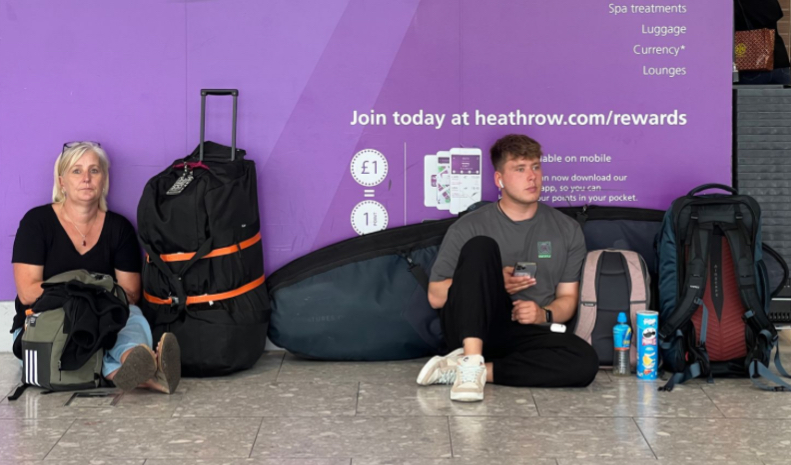What happened: Helen Steel stranded at Heathrow amid Collins Aerospace cyber attack

Helen Steel, 49, says her journey to Heathrow began at 3am on Saturday as she set out from Dorset to return home to Oslo with her cat, Thomas. But instead of boarding her flight, she claims she was met with hostility from airport staff and told she would not be allowed to travel until the following day.
Calling the ordeal “an absolute nightmare”, Ms Steel said she was deeply worried about her pet’s welfare. “I’ve been shouted at twice and ended up in tears because of the stress and the lack of information. Nobody is telling us what’s happening, and when we ask, the staff raise their voices,” she explained.
She added that she spent two hours queuing while on hold to customer service before realising she’d need to arrange overnight accommodation herself.
FAQ: Heathrow & European Airports Cyber-Attack / System Outage
What happened exactly?
- A cyber-related disruption hit Collins Aerospace’s MUSE (Multi-User System Environment) software, which supports check-in, electronic boarding, and baggage drop at several major European airports.
- As a result, many of the automated systems failed; airports had to fallback to manual check-in and baggage handling.
Which airports are affected?
- Heathrow (London) is significantly affected.
- Brussels Airport is also one of the most impacted.
- Berlin (Brandenburg) is among them.
- Some delays or knock-on effects are being reported at other European hubs.
Which parts of the system are down?
- Electronic check-in (web, kiosk) functions.
- Baggage drop automation is impacted.
- Boarding pass issuance digitally (or scanned auto gates) in some places is delayed or disabled; everything is being done manually.
Are flights cancelled or just delayed?
- Both. Some flights have been cancelled, particularly at Brussels.
- Others are delayed because manual processing is much slower.
Why is this happening? Is this confirmed as a cyber-attack?
- Yes, Collins Aerospace has acknowledged a “cyber-related disruption” in its systems.
- The exact origin or perpetrators are not yet confirmed. Investigations are underway.
How long will the disruption last?
- Unclear. Work is underway to restore full functionality.
- Given the complexity, delays may continue into the next day(s).
What should passengers do?
- Check flight status with your airline ahead of going to the airport.
- Only travel to the airport if the flight is confirmed to be operating.
- Arrive earlier than usual if your flight is still going ahead, especially for long haul. But airports are also urging people not to arrive too early if unnecessary.
What rights do passengers have for compensation, expenses, hotels?
- It depends on the airline, ticket type, and how long the delay/cancellation is. Many airlines have policies for disruption.
- You might be entitled to a refund or rebooking. In some cases, if a cancellation is announced and you have to stay overnight, airlines or airports might provide accommodation or vouchers—but reports suggest several passengers weren’t given any vouchers.
- Keep receipts if you pay out of pocket (hotel, food, transport) — these may be claimed later depending on airline / regulatory rules.
What are passengers saying?
- Frustration with lack of information and conflicting or no announcements from staff.
- Long queues and delays for manual check-in.
- Some are stranded overnight, worried about animals, accommodations.
Is this an isolated issue or part of a wider problem?
- It appears to be part of a systemic vulnerability: third-party supplier systems (like Collins Aerospace) can create single points of failure in airport operations.
- The scale (multiple airports) suggests it’s more than a local glitch.
Are any airlines not affected?
- Some airlines may have backup systems or different infrastructure which reduces impact. For example, reports suggest some airlines are less affected or not at all, depending on how they handle check-in/boarding.
What is Collins Aerospace saying?
- They’ve confirmed a cyber-related disruption.
- They say the impact is mainly on electronic operations (check-in, baggage drop) which they hope to mitigate manually.
- Efforts are underway to restore normal service.
What are authorities doing?
- Airports and airlines are working to deploy extra staff to help with manual processes.
- The UK’s National Cyber Security Centre (NCSC) and transport authorities are involved in assessing and responding.
- Passengers are being advised formally via airport websites and announcements.

